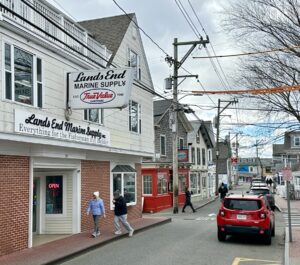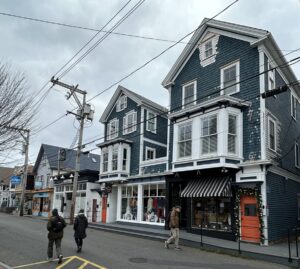PROVINCETOWN — If an autumn evening spent in a meeting room with the select board, planning board, affordable housing council, and Year-Round Market-Rate Rental Housing Trust doesn’t sound like a good time, consider what was on the table: a bylaw that would ensure that buildings on Commercial Street continue to be used for commerce — “inviting patrons in” for shopping, art, and entertainment.

At their Oct. 28 joint meeting, members of the four boards talked with town staff about that idea along with several other housing and zoning proposals that they hope to put before town meeting voters in April.
The proposed mixed-use overlay district bylaw would ban the conversion of existing commercial units that face Commercial Street into single-family homes. Instead, at least half the ground floor would have to be preserved as “retail, restaurant, art gallery, commercial service, medical, professional, bank, convenience, hardware, pharmacy, assembly hall, amusement, entertainment, guest house, bar, and other lively pedestrian-friendly uses.”
The rest of the ground floor and any upper floors could still be converted into one or more residential units. The bylaw would apply to parcels facing Commercial Street between Franklin Street in the West End and Vorse Lane in the East End and would also relax setback and lot coverage rules on those parcels.
Several restaurants on that stretch of Commercial Street have closed recently, including Way Downtown and Strangers & Saints, and other large properties are for sale, including the Lands End Marine Supply hardware store at 337 Commercial, the building at 269 Commercial where Tin Pan Alley is located, and the Packard Gallery at 418 Commercial. Each of those buildings is “mixed-use,” with at least one residential unit behind or above the commercial space, but each of them has the right to become all-residential under current zoning.
Other commercial units have also been converted to residential recently, including the former office of the Provincetown Banner and the former location of Jo Hay Gallery, both at 167 Commercial.
“The planning board feels pretty strongly about this,” said chair Dana Masterpolo at the joint meeting. “It might be a little controversial, but it’s really about keeping the life of Provincetown in Provincetown.”
Select board chair Dave Abramson said that there has been increased pressure on commercial units to convert to residential.
“Do you want to have places to eat?” Abramson asked. “Do you want to have places to shop? Do you want to have a hardware store? I think that’s the big push here.”
Numerous art galleries in the East End “are at risk of being converted from their business use,” said planning board member Michael Gaucher. “I don’t think it’s in the town’s best interest to allow that to happen.”
Money for ADUs
The proposals the boards considered also include $20,000 grants to help fund the development of new accessory dwelling units.

The town’s efforts to encourage ADUs are beginning to bear fruit, assistant housing director Mackenzie Perry told the group. After removing the affordable-rental requirement from the town’s ADU bylaw in 2018 and the year-round-occupancy requirement in 2023, the town has gone from having only one ADU to having three, with two more under construction.
The town’s only current use restriction on ADUs is that they cannot be offered for rentals of 31 days or fewer.
Perry told the boards that Wellfleet is now offering $10,000 to the builders of ADUs after construction is complete, and that Provincetown should expand on that idea. Perry described a pilot program that would offer $10,000 in pre-development grants that could be used for design work and permitting costs and another $10,000 in post-construction grants.
The grants would be available for new construction or for renovating units that aren’t up to code and would require the year-round rental of the new unit, Perry said. The pilot program would use $60,000 of the town’s housing funds from the tax on short-term rentals and would aim to stimulate the construction of three new year-round rentals.
“I think the latest numbers for construction costs are around $600,000 a unit” for ADUs, said select board member Austin Miller, adding that the incentive might not be enough to get more ADUs built.
Select board member Erik Borg suggested having the historic district commission pre-approve certain components of ADU designs in order to bring down the cost of construction.
Gaucher said that a $150,000 incentive and an affordability deed restriction might be just as likely to entice wavering homeowners.
Overall, board members seemed to agree that Perry’s pilot program was worth a try.
Expanding the Map
Town Planner Thaddeus Soulé introduced a series of measures that would upzone parts of the East End and West End by expanding some of the town’s more permissive zoning districts, including the Town Commercial Center zone and the Residential-3 zone, deeper into those neighborhoods.
Many older properties are illegal under the town’s current zoning — the technical term is “pre-existing nonconforming” — which means it is very difficult to get alterations or upgrades approved, Masterpolo said.
“Right now, we have all these nonconforming properties that run all the way down Commercial Street, and every time they go into town hall to do any sort of updates, it becomes a very complex process,” Masterpolo said.
Select board member Leslie Sandberg asked for more detailed information about what property owners might be able to do under expanded zoning before endorsing any specific changes. “If there are certain properties that are nonconforming,” she said, “why not just write a bylaw for those properties, make sure the Red Inn is fine and Seaglass Hotel is fine?”
Formula Hotels
Board members were also enthusiastic about a proposal to add hotels to the town’s existing Formula Business District bylaw, which forbids businesses owned by large companies from duplicating the logos, color schemes, and marketing that they use elsewhere.
Large companies can still open businesses here, as Luke’s Lobster did this summer, but they have to secure a special permit from the zoning board of appeals or get the town’s building commissioner to certify that they have changed their marketing enough to not qualify as a formula business.
Linchris Hotel Corp., a company based in Plymouth that now owns six Provincetown hotels, recently opened a resort in Hyannis that is branded as “Margaritaville Cape Cod.”
“I like the formula business proposal — I think it meets the spirit of the citizens’ petition at town meeting this year that asked us to look at the allocation of hotel and inn” licenses, said Austin Miller.



